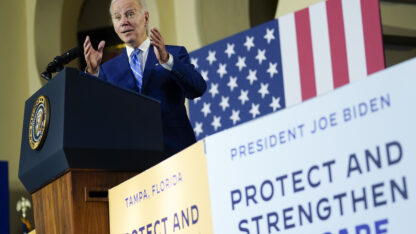The psychedelic drug MDMA can reduce symptoms of post-traumatic stress disorder, researchers reported in a new study published Thursday.
The company sponsoring the research said it plans later this year to seek U.S. approval to market the drug, also known as ecstasy, as a PTSD treatment when combined with talk therapy.
“It’s the first innovation in PTSD treatment in more than two decades. And it’s significant because I think it will also open up other innovation,” said Amy Emerson, CEO of MAPS Public Benefit Corporation, the research sponsor.
Earlier this year, Australia became the first country to allow psychiatrists to prescribe MDMA and psilocybin, the psychoactive ingredient in psychedelic mushrooms. The drugs are gaining wider cultural acceptance in the U.S. in part because of efforts by the nonprofit advocacy group Multidisciplinary Association for Psychedelic Studies.
For the new study, researchers measured symptoms in 104 people with PTSD who were randomly assigned to get either MDMA or a dummy pill during three sessions, one month apart. Both groups received talk therapy.
Common side effects in the MDMA group were muscle tightness, nausea, decreased appetite and sweating. But only one person in the MDMA group dropped out of the study.
After treatment, 86% of the MDMA group improved on a standard PTSD assessment compared to 69% of the placebo group. The assessment measures symptoms such as nightmares, flashbacks and insomnia.
By the study’s end, 72% of people in the MDMA group no longer met the diagnostic criteria for PTSD, compared to about 48% of the placebo group.
“The results that they got are very exciting,” said Barbara Rothbaum, who directs the Emory Healthcare Veterans Program in Atlanta. She was not involved in the research, which was published in the journal Nature Medicine.
PTSD also can be treated with other medications or talk therapy.
“They are very effective, but nothing is 100% effective,” Rothbaum said. “So we absolutely need more options for treatment.”
Before MDMA could be prescribed in the U.S., the Food and Drug Administration would need to approve it and the Drug Enforcement Administration would need to change its classification. MDMA is currently classified as Schedule 1, on par with heroin and deemed to have “no currently accepted medical use and a high potential for abuse.”








